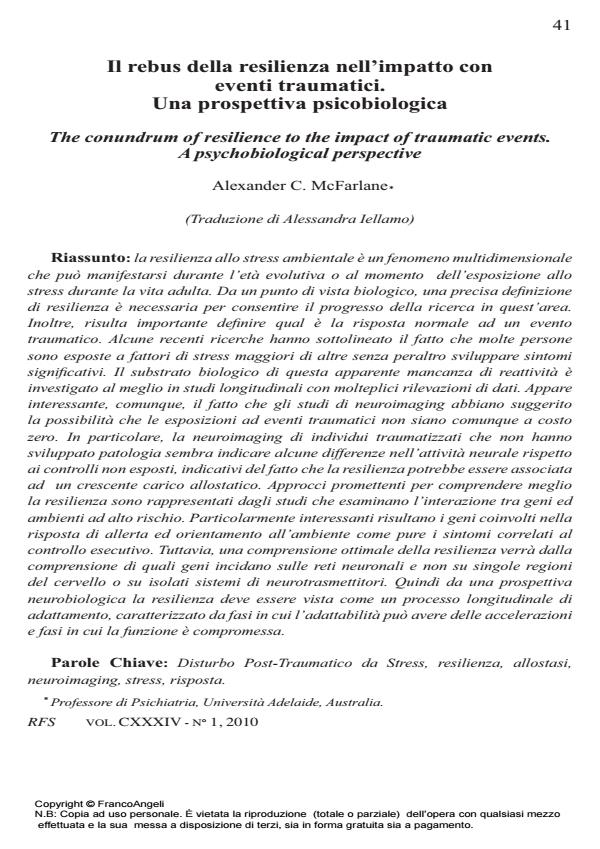The conundrum of resilience to the impact of traumatic events. A psychobiological perspective
Journal title RIVISTA SPERIMENTALE DI FRENIATRIA
Author/s Alexander C. McFarlane
Publishing Year 2010 Issue 2010/1 Language Italian
Pages 22 P. 41-62 File size 329 KB
DOI 10.3280/RSF2010-001004
DOI is like a bar code for intellectual property: to have more infomation
click here
Below, you can see the article first page
If you want to buy this article in PDF format, you can do it, following the instructions to buy download credits

FrancoAngeli is member of Publishers International Linking Association, Inc (PILA), a not-for-profit association which run the CrossRef service enabling links to and from online scholarly content.
Resilience to environmental stress is a multi-dimensional phenomenon that may be manifest during the developmental stage or at times of exposure to major stress in adulthood. From a biological point of view, a consistent defi nition of resilience is central to progressing research in this area. Furthermore, it is important to defi ne what is the normal response to a traumatic event. A variety of recent research has highlighted the fact that many people are exposed to major stressors without signifi cant symptoms. The biological underpinnings of this seeming lack of reactivity, is best investigated in longitudinal studies with multiple data points. Interestingly however, neuroimaging studies have suggested that these exposures are not without costs. In particular, traumatised individuals who have not developed psychopathology suggests some differences in neural activity in contrast to unexposed controls, indicative that resilience may be associated with increasing allostatic load. Promising approaches to better understanding resilience, are studies that examine the interaction between genes and higher risk environments. The genes of particular interest are those involved in alerting and orientation to the environment as well as symptoms involved in executive control. Therefore, optimal understanding of resilience will come from the understanding of how genes affect neural networks not single brain regional or neurotransmitter systems in isolation. Hence, from a biological perspective resilience needs to be viewed as a longitudinal process of adaptation as there are many points of potential accelerations of adaptability or compromised function.
Keywords: PTSD, resilience, allostasis, neuroimaging, stress, response.
- Reduced pre-attentive threat versus nonthreat signal discrimination in clinically healthy military personnel with recurrent combat exposure history: A preliminary event-related potential (ERP) study Andrew J. Lawrence, Ellie Lawrence-Wood, Eugene V. Aidman, Phaedra L. Spencer-Merris, Kim L. Felmingham, Alexander C. McFarlane, in Journal of Psychiatric Research /2024 pp.266
DOI: 10.1016/j.jpsychires.2024.02.033
Alexander C. McFarlane, Il rebus della resilienza nell’impatto con eventi traumatici. Una prospettiva psicobiologica in "RIVISTA SPERIMENTALE DI FRENIATRIA" 1/2010, pp 41-62, DOI: 10.3280/RSF2010-001004